Ayurveda: Ancient Energy Medicine

Over 6,000 years ago in India, during Vedic times, the rishis (enlightened seers) connected to the unified energy field and brought back information on how the body worked and what promoted health, making Ayurveda the oldest form of health care in the world. The Sanskrit term is made up of “ayus,” which means life, and “veda,” which means knowledge or science; thus ayurveda is the knowledge (or science) of life. “Ayu” comprises the mind, body, the senses, and the soul—the whole package of what we call “life.”
The fundamentals of Ayurveda can be found in the ancient Hindu scripture called the Rig Veda, which contains a series of prescriptions for helping people overcome various ailments. Ayurvedic doctors today don’t look at the illness or disease condition you have and try to treat that; instead, they look at telltale signs within your mind and body’s unique make-up to figure out where you personally are out of balance. Each person’s state of balance, and therefore the state of their health, is truly individual. In this way, ayurveda is very empowering: each of us is able to take charge of our life and healing—the very basis of energy medicine at its finest. It not only aims to help you regain balance if you’re already sick, but is very proactive in preventing illness.
Ayurveda is based on the premise that the universe is made of five elements—air, fire, water, earth, and ether. The rishis said that man is a microcosm of nature, so the five basic elements that are present in all matter also exist within each individual person and are represented by three doshas, or energies: Vata, Pitta, and Kapha. Vata (air and ether) is the force that directs nerve impulses, circulation, respiration, and elimination; kapha (water and earth) is responsible for growth and structure (protection); and pitta (fire and water) governs metabolism in digestion as well as in organ and tissue systems.
The doshas are the place where body connects with mind—the place where our thoughts turn into matter. When any of the doshas go out of balance, Ayurveda has specific lifestyle and nutritional guidelines to help individuals reduce the excess dosha and get back into balance. By restoring our doshas to a state of balance, we can have a mind-body that is always healthy. In Ayurvedic literature, a healthy person is defined as “he whose doshas are in balance, appetite is good, all tissues of the body and all natural urges are functioning properly, and mind, body, and spirit are cheerful…”
Cheerful! Are you filled with joy? Can you maintain or quickly return to a loving space in the face of adversity? Are you grateful for the blessings (and challenges) in your life?
When you see what Ayurveda means by being in balance, you can understand how this ancient system of energy medicine is light-years ahead of present-day Western medicine. The whole emphasis is on where you stand as an individual. Your unique mind-body constitution is called prakruti, which means “nature”—your individual nature or body type. It is very helpful in your own quest for health and energy healing that you learn what your prakruti is—which of the doshas are most prominent in your make-up and what you can do to keep all the doshas in balance. Through observation over time—looking at your own tongue, face, eyes, nails, and lips—you can learn to diagnose which doshas need adjustment. Ayurvedic physicans also take your pulses—the same ones an acupuncturist feels to see if your qualities of life are strong, weak, flat, fast, or shallow—and can thus tell which doshas are in excess.
There are four areas of life that can be altered to keep the doshas in balance: diet, exercise, daily routine, and seasonal routine. For Vata, the key is regularity, for Pitta it is moderation, and for Kapha it is stimulation. When Kaphas are out of balance, they tend towards sinus congestion, poor circulation, and sluggish digestion that can lead to obesity; they need to get up and move! Pittas out of balance tend toward excessive anger inflammatory conditions, and be over-stressed workaholics. Those with a Vata constitution can have poor digestion, easily catch colds, develop insomnia and fatigue. This is, of course, a very brief peek into a highly complex system of health care.
If you’d like a better idea of what your doshas are, click here for a quiz that will help you determine your prakruti. And if you’re interested in learning more, I teach Ayurveda in the LifeForce Healing Program as well as in workshops.

